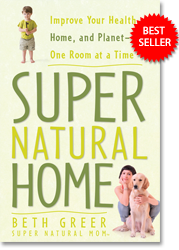 The toxic chemical BPA, or Bisphenol A is lurking in your hard plastic water bottles, baby sippy cups, dental sealants and in your canned food. BPA acts like estrogen and increases the risk of breast cancer and early puberty in women. It can cause reproductive damage and may lead to prostate and cancer and can cross into the placenta and get into your baby’s bloodstream.
The toxic chemical BPA, or Bisphenol A is lurking in your hard plastic water bottles, baby sippy cups, dental sealants and in your canned food. BPA acts like estrogen and increases the risk of breast cancer and early puberty in women. It can cause reproductive damage and may lead to prostate and cancer and can cross into the placenta and get into your baby’s bloodstream.
The Environmental Working Group tested canned food bought across America and found BPA in more than half of them at levels they call “200 times the government’s traditional safe level of exposure for industrial chemicals.” EWG found that of all foods tested, chicken soup, infant formula, and ravioli had BPA levels of highest concern. Just one to three servings of foods with these concentrations could expose a woman or child to BPA at levels that caused serious adverse effects in animal tests.
The December 2009 issue of Consumer Reports’ tested canned foods like soups, juice, tuna, and green beans, and found that almost all of the 19 name-brand foods tested contain some BPA. The canned organic foods tested did not always have lower BPA levels than nonorganic brands of similar foods analyzed. They even found the chemical in some products in cans that were labeled “BPA-free.”
This chemical is everywhere! BPA is in newspaper ink and carbonless copy paper – the stuff of credit card receipts and many business and medical documents. It turns out that the average cash register receipt has anywhere from 60 to 100 milligrams of BPA that can then be transferred onto our fingers and eventually into our body if we’re not careful. What’s not known is how much BPA is getting into our blood stream from touching receipt paper.
Also, you can’t tell if the paper receipt you were just handed at the grocery store contains BPA. They look exactly the same as the paper receipts without the toxic chemical. But there are still things you can do to protect yourself and your family. Make sure you wash your hands after touching any receipts especially if you’re pregnant. Another tip is to take all of your left over receipts out of your purse or wallet and keep them in a zip-lock bag somewhere out of children’s reach.
For now, BPA is legal to use. In the meantime, here are more ways to reduce your family’s exposure:
- Don’t use canned baby formula
- Don’t eat canned food if you’re pregnant, choose food in glass jars.
- Check your kids baby bottles and sippy cups. If you see the # 7 on the bottom replace it with BPA-free plastic, or better yet, glass. (Connecticut, Minnesota, the city of Chicago and Suffolk County, New York, have banned baby bottles and sippy cups made with BPA.)
- Choose fresh or frozen food over food in cans. The lining of cans of soups, tomato sauce and infant formula can leach BPA from the can lining.
- Don’t heat plastic in your microwave or leave water bottles in a hot car
- Use glass or metal water bottles to drink from
- Store left over food in glass containers
- Ask your dentist if the sealant being used on your kids’ teeth contains BPA
Beth Greer, Super Natural Mom™, is the bestselling author of Super Natural Home: Improve Your Health, Home and Planet…One Room at a Time as well as a radio talk show host and impassioned champion of toxin-free living who busts open the myth that our homes are safe havens. Beth is a contributing blogger for The Washington Times Communities and NaturallySavvy.com. Follow Beth on Twitter. Become a fan on Facebook.
(photo credit: The Library of Congress)


